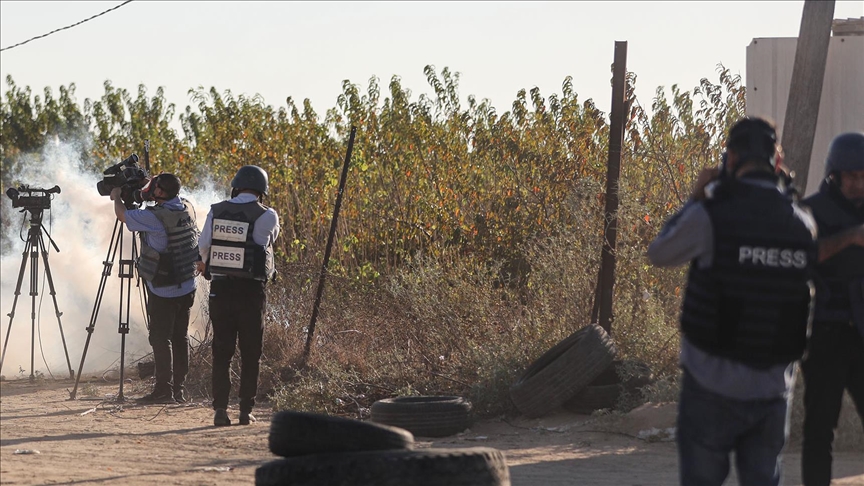Reporters Without Borders condemns Israel's attempted media blackout
10 journalists, including 8 in Gaza, killed while reporting under Israeli airstrikes

ANKARA
Reporters Without Borders (RSP) on Friday condemned Israel’s pressure on the media in the Gaza Strip for the past two weeks.
The group cited reasons including the killing or injuries of journalists, destruction of media buildings, restrictions on the internet and the decision to shut down Al Jazeera television.
RSF said the Israeli government is close to imposing a complete media blackout in Gaza in addition to the long-standing and recently intensified blockade, which is already affecting local journalists and their families.
Ten journalists, including eight in Gaza, have been killed while reporting under Israeli airstrikes, highlighting various risks faced by media personnel, it said in a statement.
Journalists have been killed in their homes from Israeli bombings and airstrikes, with the latest victim being Mohammad Baalouche, the manager of the Palestine Today television channel, who died Oct. 17 in a home attack, it said.
‘We condemn Israel’s media blackout’
The statement referenced the Palestinian Journalists Syndicate and said approximately 50 media outlets in Gaza have been damaged or destroyed by Israeli airstrikes since the start of the conflict on Oct. 7.
The blockade has obstructed most of the 24 radio stations in the region, which hampers operations due to airstrikes, bombings and fuel shortages, it said.
It raised concerns about the potential closure of Al Jazeera offices and equipment confiscation, labeling the decision “censorship” following the approval of a regulation allowing the shutdown of television channels seen as a threat to state security by the Israeli government.
RSF’s Secretary-General Christophe Deloire noted the importance of journalists being able to work for “free and reliable” news reporting.
He condemned Israel’s attempts to impose a media blackout, noting that journalism serves as a “vital antidote” to combat misinformation, especially in the context of the region.
RSF reported the arrest of one journalist in the occupied West Bank for covering the Gaza conflict, threats to a reporter during a live broadcast in Jerusalem and the “forcible” detention of three BBC correspondents by Israeli police in Tel Aviv.
Israel-Palestine conflict
Since Oct. 7, Israeli forces have killed 84 Palestinians across the occupied West Bank and 1,400 others are injured.
The conflict in Gaza, under Israeli bombardment and blockade since Oct. 7, began when Hamas initiated Operation Al-Aqsa Flood. The multi-pronged attack included a barrage of rocket launches and infiltrations into Israel by land, sea and air.
Hamas said the incursion was in retaliation for the storming of the Al-Aqsa Mosque and growing violence by Israeli settlers.
The Israeli military then launched Operation Swords of Iron against Hamas targets in the Gaza Strip.
Gaza is experiencing a dire humanitarian crisis, with no electricity and water, food, fuel and medical supplies are running out.
Israeli attacks on Gaza have killed at least 4,137 Palestinians. Hamas attacks resulted in more than 1,400 Israeli deaths.









